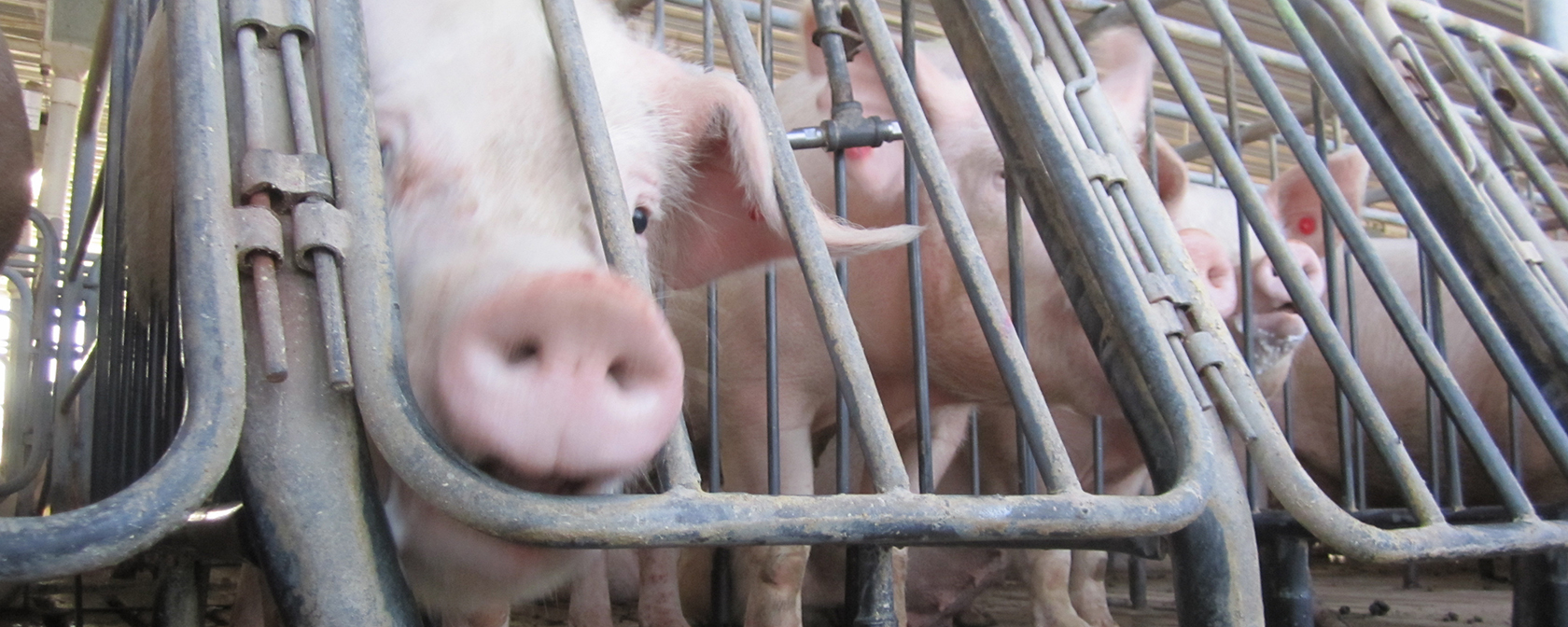By Sara Amundson and Kitty Block
Whatever doubt there may have been before, the situation is now crystal clear. The battle over California’s Proposition 12 and the Ending Agricultural Trade Suppression (EATS) Act (or some other approach to blocking Proposition 12 through the Farm Bill) has been joined, and we’re in the thick of it.
Considered the nation’s strongest farm animal protection law, Proposition 12 requires that pregnant pigs, egg-laying hens and calves raised for veal in California be given at least enough space to stand up, turn around and extend their limbs, and access to a minimum amount of usable floor space. The law, which was approved by voters in California with 63% voting in favor, also prohibits the sale in California of pork, eggs and veal from animals kept in extreme confinement not meeting those basic standards. In May 2023, the U.S. Supreme Court upheld the law.
And yet, lobbyists from big agribusiness are now trying to gut California’s landmark law concerning public health and animal welfare, and to nullify the Supreme Court decision. The political efforts to undermine the law have reached a new and dangerous level. And to be clear, it’s not just California but 14 other red, blue and purple states that have similar laws.
The most ominous sign came with the closing remarks of Rep. GT Thompson, R-Pa., at a congressional hearing on American agriculture this week. As chair of the House Committee on Agriculture, in aggressive comments concerning Proposition 12 on Wednesday, Thompson expressed his absolute determination to “fix the problem” via the Farm Bill, a five-year legislative roadmap for how food is produced across the country.
That’s the gambit we need to prevent, the one we’ve been trying to prevent, and the one we will prevent, by mobilizing with still greater intensity in the coming weeks. We must defeat the EATS Act and all related initiatives aiming to limit states’ rights to legislate farm animal welfare and the sale of cruel products within their borders. To do so, we’ll need your help―and your voice. Please join us raising the alarm to meet this imminent threat to our shared goals of addressing the cruel treatment of animals raised for food and ensuring public health and food safety through sound law-making and policy.
This fight is one of the biggest in our history. And the injustices at stake are many: The EATS Act has nothing to do with the kind of farmers most Americans want to help, the farmers they want to see survive and thrive. Those farmers do not raise animals in cruel confinement systems that deny them even the most basic behavioral instincts and requirements. Those farmers do not trade away animal health or well-being for mass production and profits. Those farmers recognize that with demand for more humane production across the country, in the European Union and elsewhere in the world, a new landscape of opportunity beckons, one that’s founded on improved animal welfare, respect for public preference and health, and a stronger standard of morality.
The EATS Act and related proposals being cooked up behind-the-scenes have nothing to do with any of that. They are simply special favor measures intended to exempt the laggard and stalling producers of low-grade factory-farmed pork, veal and eggs from regulatory compliance with basic state public health and animal welfare standards. The beneficiaries are the big factory farming corporations, some foreign owned, that have hijacked American agriculture over the last quarter century. Now they want to force their low standards upon the rest of us, and it is discouraging to see elected officials at the federal level aiding and abetting them in this effort. It’s a bottom-of-the-barrel approach if ever there was one.
The purpose of the EATS Act and related initiatives under discussion in Congress is to nullify the autonomy of state and local governments to determine what kinds of products can be sold in their markets. The EATS Act would compel state and local governments to accept products from other states that violate local moral standards and health regulations, contrary to the nation’s founding principle of federalism.
The false narratives being spun about Proposition 12 are contradicted by pundits in the agricultural press. Sometimes it seems as though some federal officials worried about the pork market are not reading the same industry journals we do, because one after another, industry experts have dismissed concerns that Proposition 12 has exerted negative effects on pricing or profits for pork.
Writing in the Feb. 5 issue of the National Hog Farmer, an agricultural commodities broker declared with confidence that the “market has fully adjusted to Prop 12,” that “margins are highly profitable,” and that “U.S. pork exports are rising.” A Feb. 9 Wall Street Journal article cited industry research showing that pork was losing market share as a result of changing public tastes and not price. In its March 1-15 market report, swineweb stated that “[i]creased pork production and the impact of California’s Prop 12 restrictions taking effect were expected to exert a negative impact on prices but that has not happened.”
It would be particularly irresponsible for Congress to dismantle state laws like Proposition 12 when an ever-growing number of producers are embracing higher standards of animal welfare. A recent Forbes profile of one producer shows that it’s not just possible but profitable to shift from extreme confinement of animals to higher welfare systems.
The EATS Act has become the political albatross of American agricultural policy, and it threatens to tank the whole Farm Bill. We will continue to urge members of the Agriculture Committee and others in Congress not to fall for the disingenuous arguments the pork lobby is serving up. America and its animals can’t afford it.
Kitty Block is CEO of the Humane Society of the United States.




